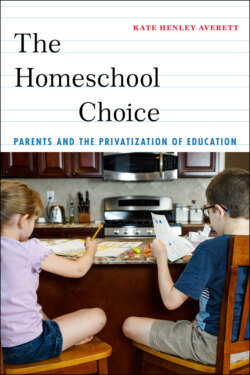Читать книгу The Homeschool Choice - Kate Henley Averett - Страница 28
На сайте Литреса книга снята с продажи.
Concerns about Peer Influence
ОглавлениеFor other parents, the official curriculum of schools was less of an issue than the lessons children learned in school from their peers. Jasmine, a Black, married, middle-income, stay-at-home mother of two (soon to be three), explained to me that, before having children, she had never imagined she would homeschool. But when she and her husband began thinking of having children, she was “starting to see the types of things that public schools were teaching, and the types of kids that were coming out of public school, and things I was hearing out of young kids, and things they were exposed to, I was like, oh my! You know, six-year-olds talking about things that six-year-olds shouldn’t be talking about.” When I asked her for an example of the types of things to which she was concerned about children being exposed, she recounted hearing a child at her church talking about sex: “There’s a little boy, he was probably six or seven, and he was talking to someone about—he knew how babies were made. And, he knew, pretty in detail, how babies were made, for a six-year-old. And I was like, oh my goodness! And then I heard his mom talking about it and how she was mortified that he knew all this stuff, and that he had learned it from kids at school. And I was like, oh my gosh, at six! That’s kindergarten!” Though Jasmine implied that the knowledge this young boy was recounting was factually correct (“he knew pretty in detail”) and focused on the biological process of “how babies are made,” she felt that this was not knowledge that a young child should have. In noting that he had acquired this knowledge from his peers in a school setting, Jasmine constructed schools as spaces in which children are not protected from this knowledge—and thus as potentially threatening spaces.
This concern about what information children are exposed to was not limited to very young children. Janice, a white, married, middle-income mother of four, did not homeschool her older three children, now adults and parenting their own children, because at the time, she was not really aware of homeschooling. Janice and her second husband had adopted their now-teenaged son, Mark, as older parents, and she explained her decision to homeschool him in relation to her older children’s experiences in public school, saying, “I wish they hadn’t been in that environment. And there was just a lot of garbage that I didn’t need my children being raised around. Not that I’m interested in protecting Mark to the point where he couldn’t function in society. But there’s some things a sixth-grade girl doesn’t need to learn until she’s in high school.” When I asked her to clarify, she named both sex education and the language students used in school as examples of things to which middle and high school students should not be exposed. Interestingly, her example implied that it was more important to protect girls from exposure to this knowledge than boys, indicating that the protection of children’s innocence is a gendered process.9
